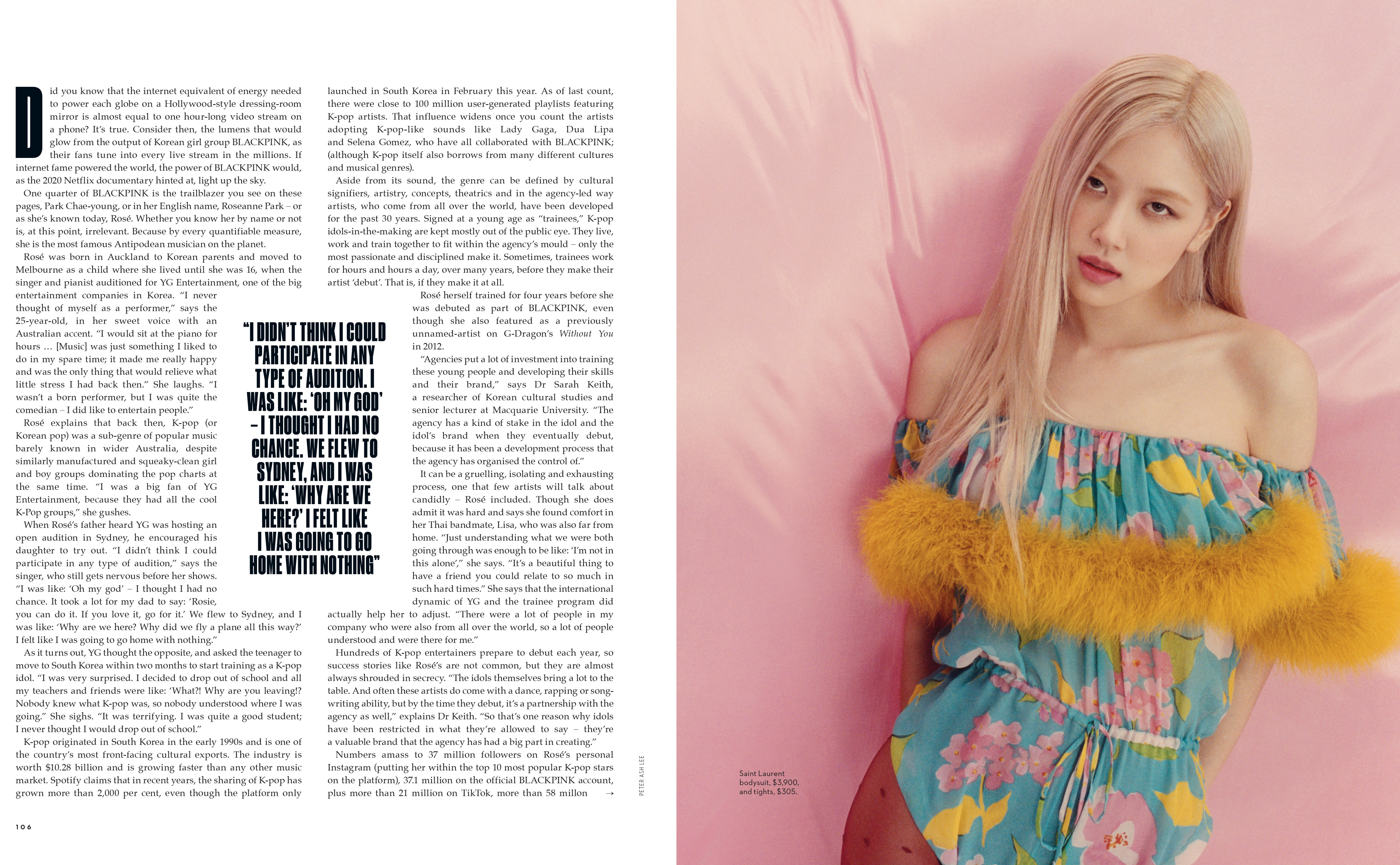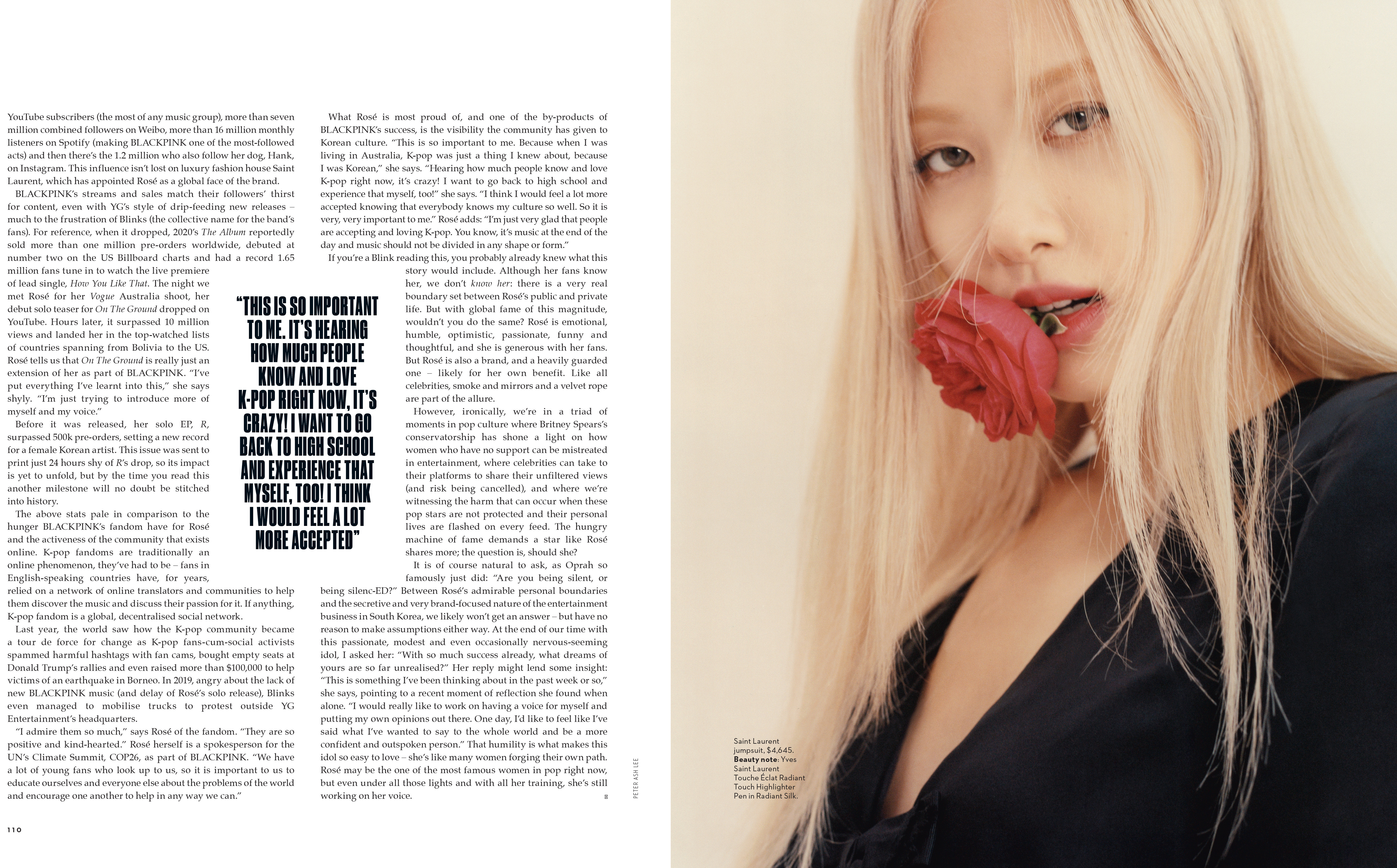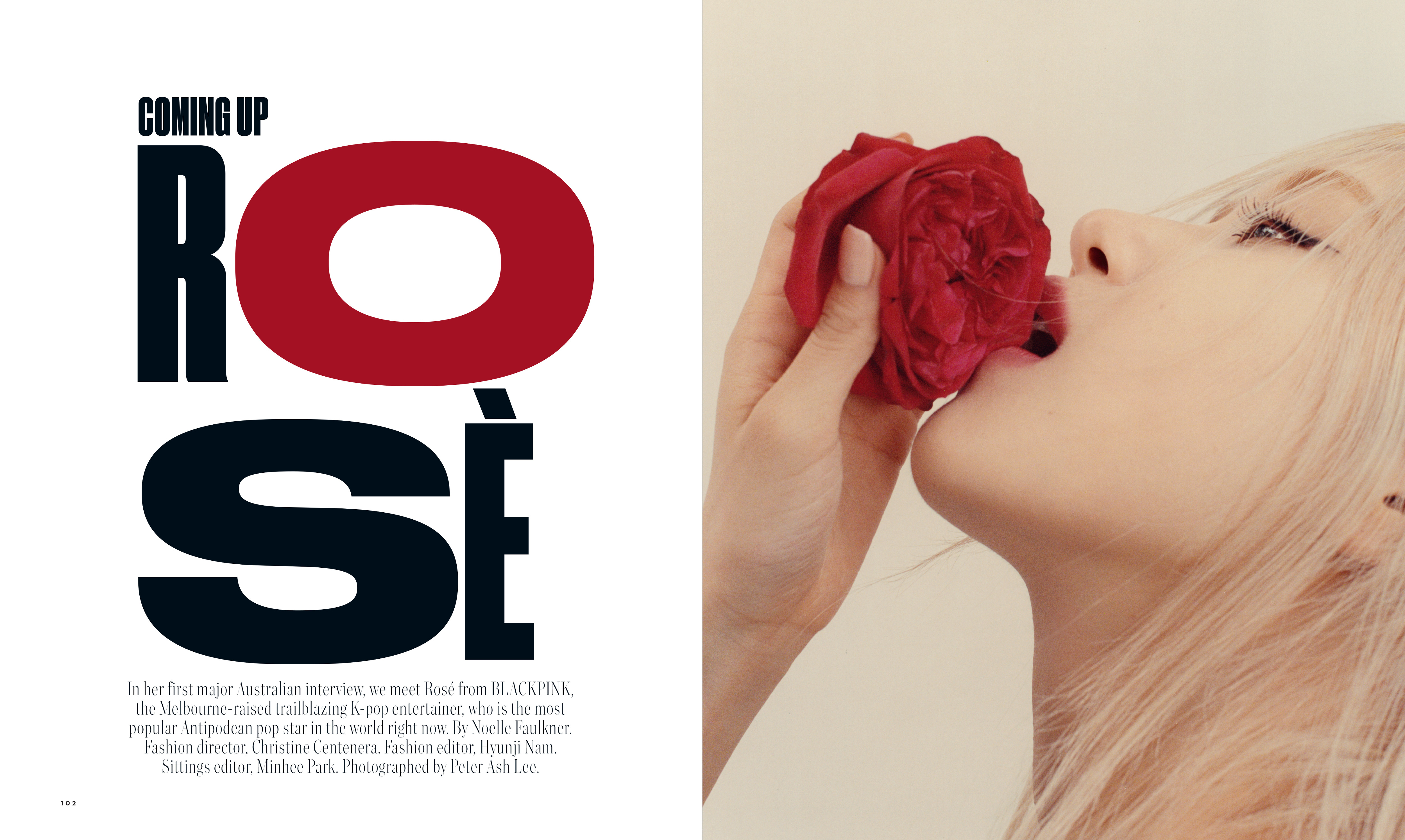BLACKPINK'S ROSÉ: AN AUSTRALIAN IDOL
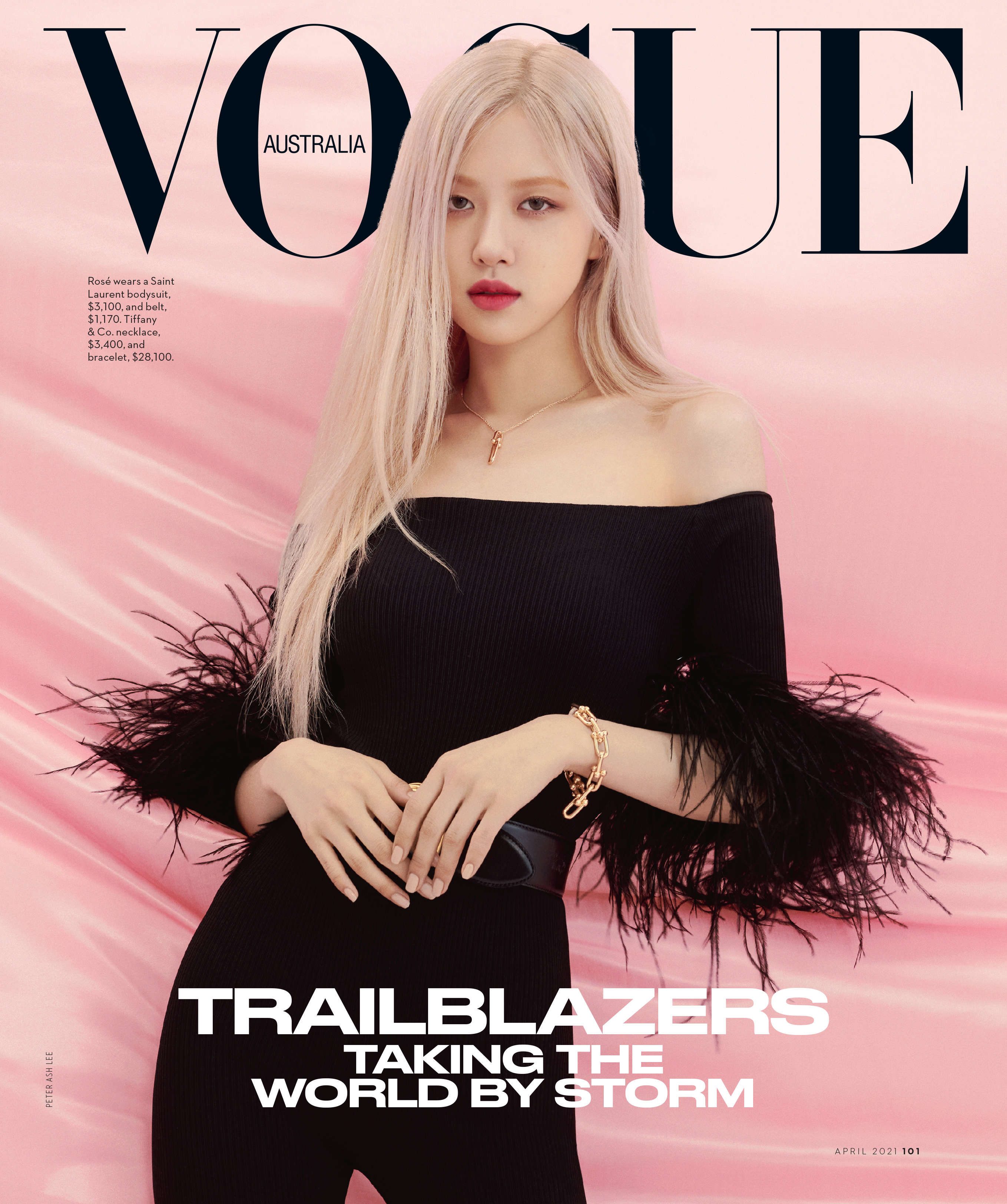
Vogue Australia, April 2021 (LINK) (PDF)
In her first-ever cover for Vogue Australia, we meet Rosé from BLACKPINK, the Melbourne-raised trailblazing entertainer changing the face of K-pop. By Noelle Faulkner.
Did you know that the internet equivalent of energy needed to power each globe on a Hollywood-style dress ing-room mirror is almost equal to one hour-long video stream on a phone? It’s true. Consider then, the lumens that would glow from the output of Korean girl group BLACKPINK, as their fans tune into every live stream in the millions. If internet fame powered the world, the power of BLACKPINK would, as the 2020 Netflix documentary hinted at, light up the sky.
One quarter of BLACKPINK is the trailblazer you see on these pages, Park Chae-young, or in her English name, Roseanne Park—or as she’s known today, Rosé. Whether you know her by name or not is, at this point, irrelevant. Because by every quantifiable measure, she is the most famous Antipodean musician on the planet.
Did you know that the internet equivalent of energy needed to power each globe on a Hollywood-style dress ing-room mirror is almost equal to one hour-long video stream on a phone? It’s true. Consider then, the lumens that would glow from the output of Korean girl group BLACKPINK, as their fans tune into every live stream in the millions. If internet fame powered the world, the power of BLACKPINK would, as the 2020 Netflix documentary hinted at, light up the sky.
One quarter of BLACKPINK is the trailblazer you see on these pages, Park Chae-young, or in her English name, Roseanne Park—or as she’s known today, Rosé. Whether you know her by name or not is, at this point, irrelevant. Because by every quantifiable measure, she is the most famous Antipodean musician on the planet.
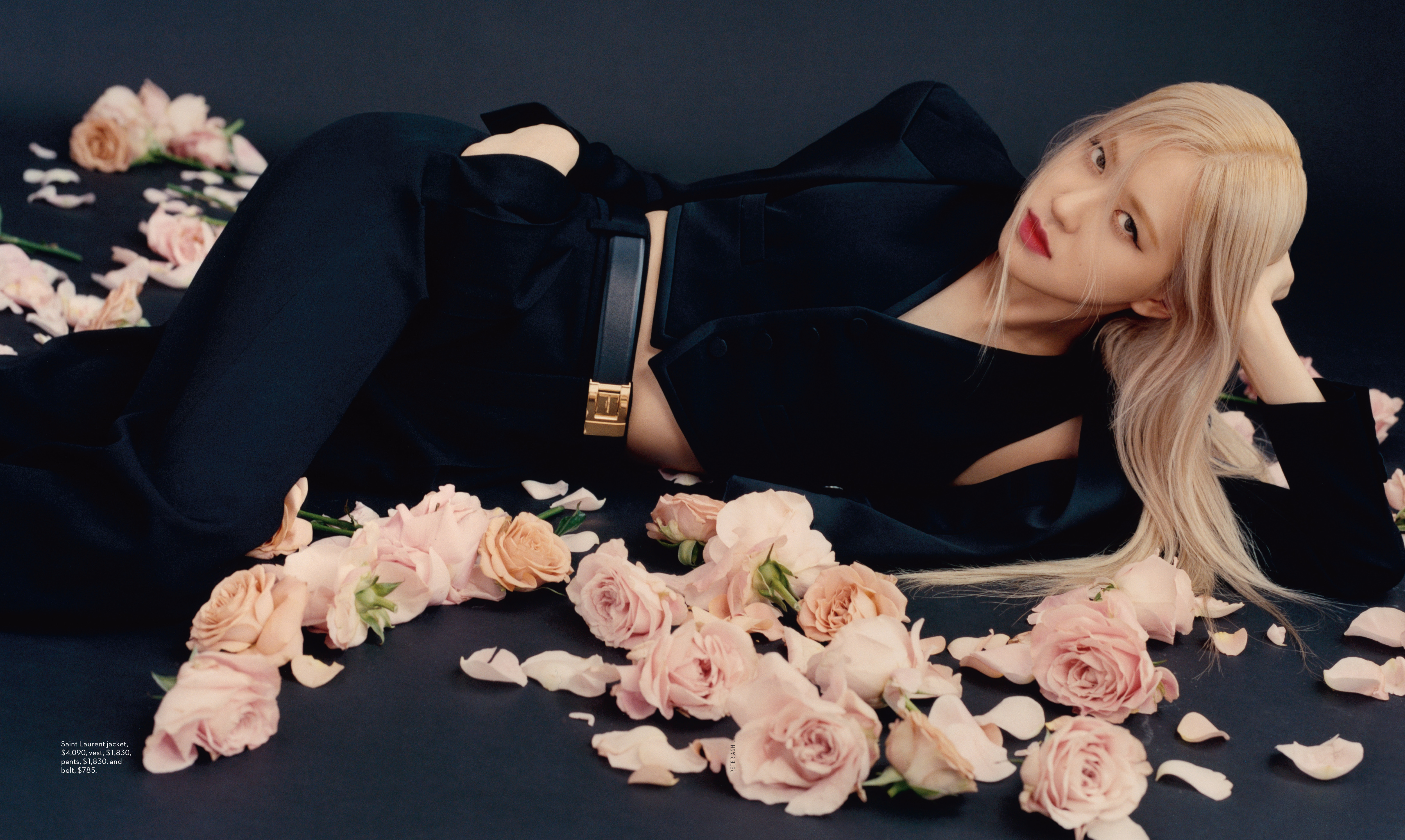
Rosé was born in Auckland to Korean parents and moved to Melbourne as a child where she lived until she was 16, when the singer and pianist auditioned for YG Entertainment, one of the big entertainment companies in Korea.
“I thought of myself as a performer,” says the 25-year-old, in her sweet voice with an Australian accent. “I would sit at the piano for hours ... [Music] was just something I liked to do in my spare time; it made me really happy and was the only thing that would relieve what little stress I had back then.” She laughs. “I wasn’t a born performer, but I was quite the comedian—I did like to entertain people.” Rosé explains that back then, K-pop (or Korean pop) was a sub-genre of popular music barely known in wider Australia, despite
similarly manufactured and squeaky-clean girl and boy groups dominating the pop charts at the same time. “I was a big fan of YG Entertainment, because they had all the cool K-Pop groups,” she gushes.
When Rosé’s father heard YG was hosting an open audition in Sydney, he encouraged his daughter to try out. “I didn’t think I could participate in any type of audition,” says the singer, who still gets nervous before her shows. “I was like: ‘Oh my god’—I thought I had no chance. It took a lot for my dad to say: ‘Rosie, you can do it. If you love it, go for it.’ We flew to Sydney, and I was like: ‘Why are we here? Why did we fly a plane all this way?’ I felt like I was going to go home with nothing.”
As it turns out, YG thought the opposite, and asked the teenager to move to South Korea within two months to start training as a K-pop idol. “I was very surprised. I decided to drop out of school and all my teachers and friends were like: ‘What?! Why are you leaving!? Nobody knew what K-pop was, so nobody understood where I was going.” She sighs. “It was terrifying. I was quite a good student; I never thought I would drop out of school.”
K-pop originated in South Korea in the early 1990s and is one of the country’s most front-facing cultural exports. The industry is worth $10.28 billion and is growing faster than any other music market. Spotify claims that in recent years, the sharing of K-pop has grown more than 2,000 per cent, even though the platform only launched in South Korea in February this year. As of last count, there were close to 100 million user-generated playlists featuring K-pop artists. That influence widens once you count the artists adopting K-pop-like sounds like Lady Gaga, Dua Lipa and Selena Gomez, who have all collaborated with BLACKPINK; (although K-pop itself also borrows from many different cultures and musical genres).
Aside from its sound, the genre can be defined by cultural signifiers, artistry, concepts, theatrics and in the agency-led way artists, who come from all over the world, have been developed for the past 30 years. Signed at a young age as “trainees,” K-pop idols-in-the-making are kept mostly out of the public eye. They live, work and train together to fit within the agency’s mould—only the most passionate and disciplined make it. Sometimes, trainees work for hours and hours a day, over many years, before they make their artist ‘debut’. That is, if they make it at all.
Rosé herself trained for four years before she was debuted as part of BLACKPINK, even though she also featured as a previously unnamed-artist on G-Dragon’s Without You in 2012. “Agencies put a lot of investment into training these young people and developing their skills and their brand,” says Dr Sarah Keith, a researcher of Korean cultural studies and senior lecturer at Macquarie University. “The agency has a kind of stake in the idol and the idol’s brand when they eventually debut, because it has been a development process that the agency has organised the control of.”
It can be a gruelling, isolating and exhausting process, one that few artists will talk about candidly—Rosé included. Though she does admit it was hard and says she found comfort in her Thai bandmate, Lisa, who was also far from home. “Just understanding what we were both going through was enough to be like: ‘I’m not in this alone’,” she says. “It’s a beautiful thing to have a friend you could relate to so much in such hard times.” She says that the international dynamic of YG and the trainee program did actually help her to adjust. “There were a lot of people in my company who were also from all over the world, so a lot of people understood and were there for me.”
It can be a gruelling, isolating and exhausting process, one that few artists will talk about candidly—Rosé included. Though she does admit it was hard and says she found comfort in her Thai bandmate, Lisa, who was also far from home. “Just understanding what we were both going through was enough to be like: ‘I’m not in this alone’,” she says. “It’s a beautiful thing to have a friend you could relate to so much in such hard times.” She says that the international dynamic of YG and the trainee program did actually help her to adjust. “There were a lot of people in my company who were also from all over the world, so a lot of people understood and were there for me.”
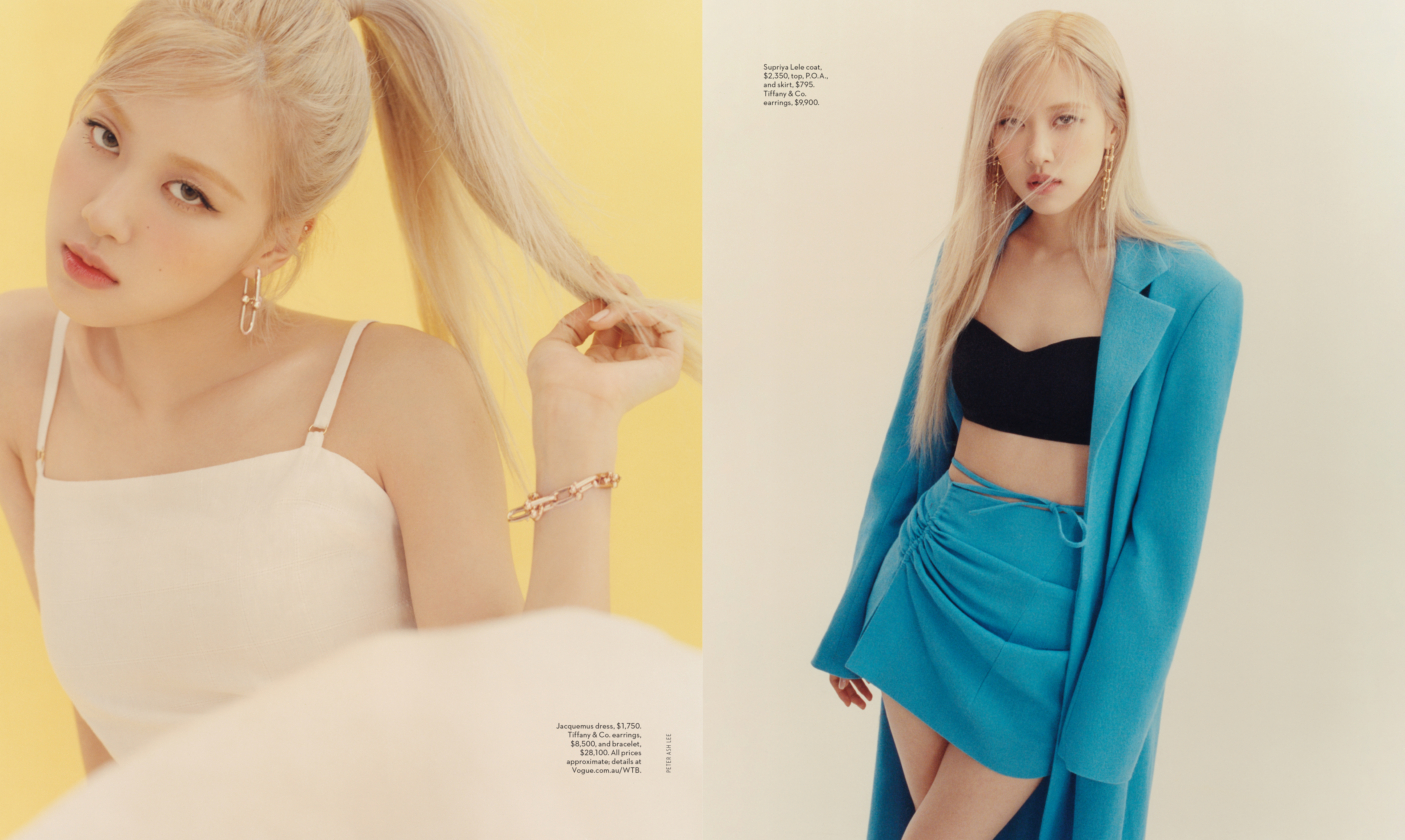
Hundreds of K-pop entertainers prepare to debut each year, so success stories like Rosé’s are not common, but they are almost always shrouded in secrecy. “The idols themselves bring a lot to the table. And often these artists do come with a dance, rapping or song- writing ability, but by the time they debut, it’s a partnership with the agency as well,” explains Dr Keith. “So that’s one reason why idols have been restricted in what they’re allowed to say—they’re a valuable brand that the agency has had a big part in creating.”
Numbers amass to 37 million followers on Rosé’s personal Instagram (putting her within the top 10 most popular K-pop stars on the platform), 37.1 million on the official BLACKPINK account, plus more than 21 million on TikTok, more than 58 million YouTube subscribers (the most of any music group), more than seven million combined followers on Weibo, more than 16 million monthly listeners on Spotify (making BLACKPINK one of the most-followed acts) and then there’s the 1.2 million who also follow her dog, Hank, on Instagram. This influence isn’t lost on luxury fashion house Saint Laurent, which has appointed Rosé as a global face of the brand.
BLACKPINK’s streams and sales match their followers’ thirst for content, even with YG’s style of drip-feeding new releases – much to the frustration of Blinks (the collective name for the band’s fans). For reference, when it dropped, 2020’s The Album reportedly sold more than one million pre-orders worldwide, debuted at number two on the US Billboard charts and had a record 1.65 million fans tune in to watch the live premiere of lead single, How You Like That. The night we met Rosé for her Vogue Australia shoot, her debut solo teaser for On The Ground dropped on YouTube. Hours later, it surpassed 10 million views and landed her in the top-watched lists of countries spanning from Bolivia to the US.
Rosé tells us that On The Ground is really just an extension of her as part of BLACKPINK. “I’ve put everything I’ve learnt into this,” she says shyly. “I’m just trying to introduce more of myself and my voice.” Before it was released, her solo EP, R, surpassed 500k pre-orders, setting a new record for a female Korean artist. This issue was sent to print just 24 hours shy of R’s drop, so its impact is yet to unfold, but by the time you read this another milestone will no doubt be stitched into history.
The above stats pale in comparison to the hunger BLACKPINK’s fandom have for Rosé and the activeness of the community that exists online. K-pop fandoms are traditionally an online phenomenon, they’ve had to be—fans in English-speaking countries have, for years, relied on a network of online translators and communities to help them discover the music and discuss their passion for it. If anything, K-pop fandom is a global, decentralised social network. Last year, the world saw how the K-pop community became a tour de force for change as K-pop fans-cum-social activists spammed harmful hashtags with fan cams, bought empty seats at Donald Trump’s rallies and even raised more than $100,000 to help victims of an earthquake in Borneo. In 2019, angry about the lack of new BLACKPINK music (and delay of Rosé’s solo release), Blinks even managed to mobilise trucks to protest outside YG Entertainment’s headquarters.
“I admire them so much,” says Rosé of the fandom. “They are so positive and kind-hearted.” Rosé herself is a spokesperson for the UN’s Climate Summit, COP26, as part of BLACKPINK. “We have a lot of young fans who look up to us, so it is important to us to educate ourselves and everyone else about the problems of the world and encourage one another to help in any way we can.”
What Rosé is most proud of, and one of the by-products of BLACKPINK’s success, is the visibility the community has given to Korean culture. “This is so important to me. Because when I was living in Australia, K-pop was just a thing I knew about, because I was Korean,” she says. “Hearing how much people know and love K-pop right now, it’s crazy! I want to go back to high school and experience that myself, too!” she says. “I think I would feel a lot more accepted knowing that everybody knows my culture so well. So it is very, very important to me.” Rosé adds: “I’m just very glad that people are accepting and loving K-pop. You know, it’s music at the end of the day and music should not be divided in any shape or form.”
If you’re a Blink reading this, you probably already knew what this story would include. Although her fans know her, we don’t know her: there is a very real boundary set between Rosé’s public and private life. But with global fame of this magnitude, wouldn’t you do the same? Rosé is emotional, humble, optimistic, passionate, funny and thoughtful, and she is generous with her fans. But Rosé is also a brand, and a heavily guarded one – likely for her own benefit. Like all celebrities, smoke and mirrors and a velvet rope are part of the allure.
However, ironically, we’re in a triad of moments in pop culture where Britney Spears’s conservatorship has shone a light on how women who have no support can be mistreated in entertainment, where celebrities can take to their platforms to share their unfiltered views (and risk being cancelled), and where we’re witnessing the harm that can occur when these pop stars are not protected and their personal lives are flashed on every feed. The hungry machine of fame demands a star like Rosé shares more; the question is, should she?
It is of course natural to ask, as Oprah so famously just did: “Are you being silent, or being silenc-ED?” Between Rosé’s admirable personal boundaries and the secretive and very brand-focused nature of the entertainment business in South Korea, we likely won’t get an answer – but have no reason to make assumptions either way. At the end of our time with this passionate, modest and even occasionally nervous-seeming idol, I asked her: “With so much success already, what dreams of yours are so far unrealised?”
Her reply might lend some insight: “This is something I’ve been thinking about in the past week or so,” she says, pointing to a recent moment of reflection she found when alone. “I would really like to work on having a voice for myself and putting my own opinions out there. One day, I’d like to feel like I’ve said what I’ve wanted to say to the whole world and be a more confident and outspoken person.” That humility is what makes this idol so easy to love – she’s like many women forging their own path. Rosé may be the one of the most famous women in pop right now, but even under all those lights and with all her training, she’s still working on her voice.
Photographed by Peter Ash Lee
Fashion director Christine Centenera
Fashion editor Hyunji Nam
Styled by Minhee Park
Hair by Seonyeong Lee
Make-up by Myungsun Lee
Talent director Rikki Keene
Set designer Seoyun Choi
